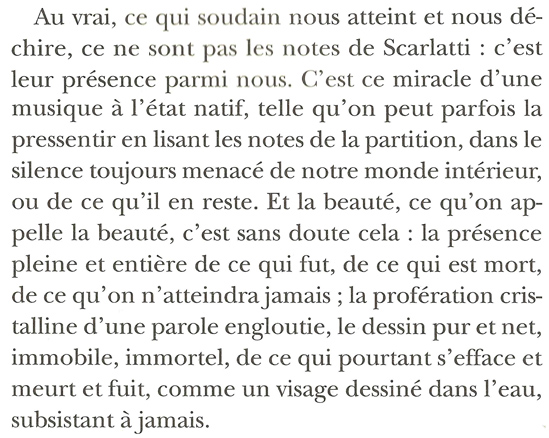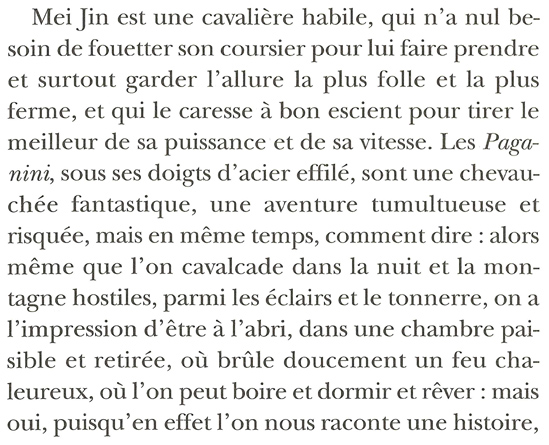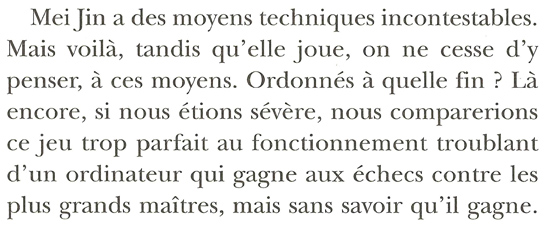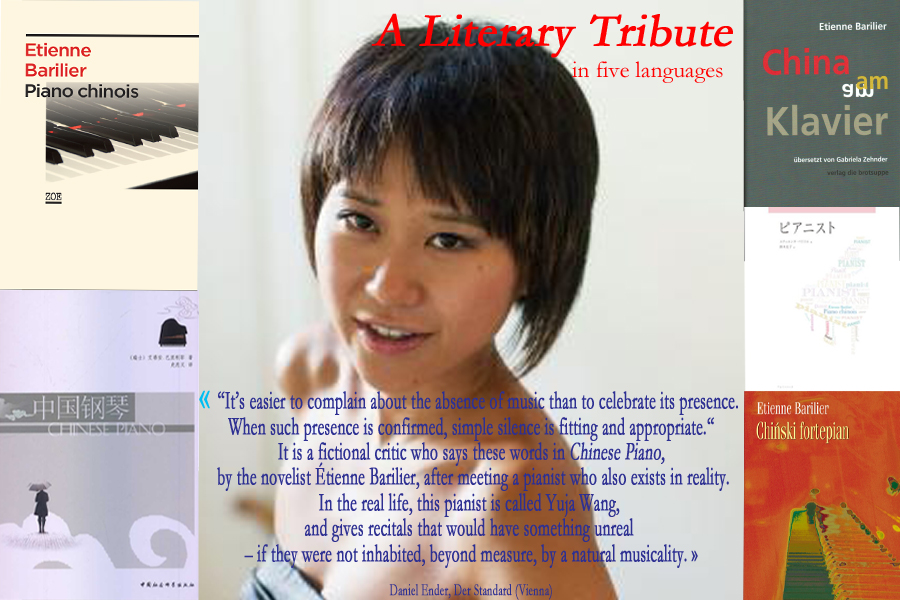Étienne Barilier: Piano chinois / China am Klavier / Chinese Piano
(Yuja Wang, Depicted in Literature)
Book Review
2015-03-24 — Original posting
2015-03-25 — Minor corrections / expansions
2016-01-06 — Amended for the English translation now available; more amazon links
2016-08-03 — Brushed up for better readability
Outline
- Introduction
- How I got into this Topic
- What is this book about?
- How is the book written?
- The Author’s Relation to the Topic
- About the German Translation
- But…
- About the author
- Other reviews
- Bibliographic References
Introduction
This posting might seem rather paradoxical — for several reasons:
- The book that I’m reviewing has only just become available in English. The original has been written in French. I also have the German translation. Chinese, Japanese, and Polish translations are available as well.
- I have no experience in reviewing books (and I’m a slow reader!)
- my blog is in English, the number of German (let alone French) speaking visitors to this blog is small,
- for reasons outlined below, I think it makes more sense to base the review on the French original rather than the German translation
- but my experience in writing French is far too limited to even attempt writing a review in French, so…
Here it comes: my short review of a French book (and its German translation), indirectly about a Chinese pianist. And it’s all written in my limited American English! It isn’t quite that paradoxical, though, because an English translation has just become available. You can read this in anticipation of the translation, to which — mutatis mutandis — this review will be applicable as well.
How I got into this Topic
This note was triggered by my reviews of concerts given by Yuja Wang here in Zurich last summer (one where she played Sergei Prokofiev’s Piano Concerto No.2 in G minor, op.16, and an evening with Chamber Music by Mendelssohn, Dvořák and Rachmaninoff). In these posts, I was also trying to respond to a bad review that Yuja Wang had received in a radio program on France Musique a while ago. These blog posts / reviews led Étienne Barilier to contact me about this artist.
Étienne Barilier (*1947, see also Wikipedia.fr) is a writer (romancier, essayist), as well as a philosopher and a translator, living in the French-speaking part of Switzerland. He has written novels and essays covering a wide range of topics, also on the subject of music, e.g., an essay on Alban Berg, and another one on the history of the name B-A-C-H in music. See the bibiographic references below for details. In 2011 he has written and published the following novel:
The original text in French (left) is “Piano chinois” by Étienne Barilier (Éditions Zoé). The German translation (center) is available as “China am Klavier” by Étienne Barilier, translated by Gabriela Zehnder (verlag die brotsuppe). The English translation (right) has been published as “Chinese Piano” or “Dueling over a Recital“, translated by Benjamin Ivry (Verlag Traugott Bautz). For bibliographic information see again the bottom of this article.
What is this book about?
The Subject of the Book: Mei Jin, a.k.a. Yuja Wang
Preceding the “action” in this book, a Chinese pianist, Mei Jin (more than just inspired by Yuja Wang) gives a recital at a festival in La Roque d’Anthéron (a small, medieval town near Aix-en-Provence, in the South of France). Mei Jin is playing Scarlatti sonatas, Brahms’ Paganini-Variations and the Sonata op.35 by Chopin.
Frédéric Ballade, Music Critic
A music critic, writing under the pseudonym Frédéric Ballade (I instantly & intuitively read the last name as Chopin) is writing raving review posts about this concert in his blog. He describes the artist as the new star in the piano universe. He praises her sublime art, her astounding technique. And he notes how she can play the most difficult pieces in the piano literature (such as the Paganini Variations by Brahms) without visible effort, even completely relaxed (if not with a smile), yet with a lot of sensibility and a sense for the emotional content of the music.
Léo Poldowsky, Music Critic
A second music critic is writing under the pseudonym Léo Poldowsky, unmistakably referring to the pianist-composer Leopold Godowsky. He is also running a blog and attended Mei Jin’s concert. In contrast to Frédéric Ballade, Poldowsky was not touched by Mei Jin’s playing at all. He described it as purely technical, without expression. And he takes her relaxed facial expression and body language as clear sign for lacking emotions. He calls this “cold technique”, acquired through relentless (if not mindless) exercising.
For him, this is a “typical Asian” phenomenon: an example for artists from the Far East who are trying to enter the Western concert scene & music industry without really understanding its music in first place. He seems to be under the impression that China is subversively flooding the Western music market with young talents, all trained to perfection.
It’s true: we do indeed see many Asian talents in the music scene. But of course, the population of the Far East is still vastly underrepresented in the world of music.
An Escalating Confrontation
The two critics work their way through Mei Jin’s concert, discussing piece by piece (if not movement by movement) in successive blog posts. Mr. Ballade’s affection and admiration for Mei Jin’s playing grows from post to post. In contrast, Poldowsky is moving into the opposite direction. Inevitably, the two critics are reading each other’s blogs. The discussion that ensues, first in additional blog posts, later in personal e-mails, evolves into a heated debate. It is fascinating to see how both gradually lose their attitude. As it turns out, the two critics know each other from earlier times- So, the discussion gets personal…
I don’t want to reveal too much of how the story evolves into a rather unexpected ending, but I can assure, it’s very entertaining!
How is the book written?
When Monsieur Barilier offered to send me a copy of his book, I didn’t hesitate asking for the French version. I anticipated that a translation to German (or, in fact, most other languages) could hardly reflect the flow, the philosophy, the sophistication and the poetry in the French language. So, I started off reading the French version of the book.
What instantly caught my attention was the fact that this is much more than a simple epistolary novel. Étienne Barilier’s text if of highest literary standards, very poetic, very well and carefully written, indeed. In fact, it is obvious that the author is not only drawing from a rich and very refined vocabulary, but also from in-depth knowledge in history and mythology. I don’t mean to say that this level of knowledge is prerequisite for reading and understanding the book. But of course it is helpful and increases the reading pleasure. Just as I anticipated: the text is “very French”, i.e., embedded in and making use of the French language philosophy, the rhythm of the language, its inherent poetry and symbolism. I could hardly imagine how one would transfer the spirit of this book into any other idiom.
Readers with Marginal Knowledge in French…
However, to my dismay I soon found that reading the original (with its vocabulary that exceeds mine by an order of magnitude) would take me forever, at least if I really wanted to enjoy, understand and digest the details of the language. So, I added the German translation as well, just to help myself getting through the book. See below for details on the translations. I have read the German version in full, the French version I’m still ingesting.
Some Sample Excerpts
Let me add a couple short excerpts from the original text, just to give you an impression on Étienne Barilier’s writing. Here’s a short segment from Frédéric Ballade’s first entry in his blog (which aptly runs under the title “À la musique“), about Mei Jin’s interpretation of Domenico Scarlatti’s sonata K.87 (p. 8/9):
and in Ballade’s second blog entry, about the interpretation of the Paganini-Variations by Johannes Brahms (p.17):
Léo Poldowsky labels his blog “Adieu pianos…”. In his comments on the same concert he describes Mei Jin along the lines of the following excerpt, taken from Poldowsky’s first blog post, p.12:
It is very obvious which side the author is taking, given the “poetic effort” he invests in Ballade’s writing. Poldowsky’s language is more direct, maybe more technical. In a way, Poldowsky’s language is reflecting how the critic pictures Mei Jin in the above excerpt.
Some Thoughts aside…
A thought that I just had (maybe something worth discussing in a wider context?): aren’t the critics just (or also) describing their personal character traits? In other words: aren’t they projecting their own traits into the artist and her playing? This book would certainly be an excellent starting point for a discussion on objectivity in music reception (if that exists at all), or on the relation between music reception and the listener’s (and in particular, the music critic’s) mind(set), character, mood, etc.
The Author’s Relation to the Topic
Étienne Barilier is not a music critic by profession. But it is clear that he has a deep understanding of the music he is describing in this book. At the same time, it is also clear how deeply he was moved by Yuja Wang’s playing. Obviously, he didn’t just write this book out of the interesting idea of an encounter between two music critics with vastly different perceptions of an artist. First and foremost, he wrote it in order to do justice to an excellent, fascinating, young artist. But one doesn’t need to be a fan of Yuja Wang to enjoy this book, for sure!
About the German Translation
The German translation, “China am Klavier” (done by Gabriela Zehnder, see above), is written in decent German. Not word by word, of course, but duly transferring the content of every sentence into the German text. The result is easy to read, fluent. There are a few exceptions, where the French logic appears to “shine through”, yielding a non-ideal result: some sentences would sound better after some rearrangement.
Étienne Barilier asked me for comments on the German translation. He also stated that he thinks Gabriela Zehnder is a very good translator. My response was, that the translation “reads like a German book”. M. Barilier instantly understood what I meant: also as a German book it is a well-written novel, clear, entertaining. All of the story is there. However, to me — just as I suspected — it lacks most of the poetry, the imagination, the compelling flow and the melody of the language in the French original. In that sense, I suspect that the book is not fully transferable to the German idiom. This likely applies to the English translation as well. Even other Latin languages may have similar issues. One would need to “reinvent” the text for that language, which essentially implies writing a new (and very different) book.
On the Topic of Translations in General
I discussed this with Étienne Barilier — and he very much understood what I meant. In fact, as it turned out, he is an expert on the subject of translating. He has even been teaching lessons on this subject at the Université de Lausanne! He also has published translations himself — in particular, from German into French. The Centre de Traduction Littéraire de Lausanne has published his bilingual book “Lyrisches Intermezzo / Intermezzo Lyrique“, a translation of Heinrich Heine‘s collection “Lyrisches Intermezzo” (“Lyrical Intermezzo”, 1823) of most popular poems (see below for the bibliographic information). Many of these poems we all know and love as Lieder by Robert Schumann and other composers. He has given me a copy which I’m reading with pleasure. But I would not dare judging the translations, as I’m not truly bilingue.
Original vs. Translation
The above comment on “China am Klavier” may sound rather negative. It isn’t really meant to be. I merely wanted to indicate that a text such as Étienne Barilier’s “Piano chinois” can not be translated to full extent. If you don’t know French, obviously the only option is to read one of the available translations (besides German, translations to Polish, Chinese and Japanese are also available). On the other hand, if you know French inside out, the original version obviously is the prime choice: don’t even bother with translations.
If your French is somewhat marginal, but you still would like to get an idea about the true & high literary qualities of this book, you will find yourself consulting dictionaries frequently. My recommendation then would be that you take the translation, but ideally have the French version at hand and read the two versions in parallel. In other words: have the translation help you reading the original, or, conversely, use the French original to widen your experience while reading the translation!
But…
This is more than a well-written literary artwork. Étienne Barilier is not only an excellent writer, but he also has a deep and thorough understanding of the music he is writing about. None of his writing is “made up”. As mentioned, there is no doubt that the author is siding with Mei Jin. Rather: the key motivator / driving force for writing this book was Étienne Barilier’s own encounter with Yuja Wang in her concerts, and his fascination about this artist. Consequently, I have read this book as one on Yuja Wang rather than the imaginary pianist Mei Jin.
You don’t need to agree to 100% with the way in which Yuja Wang’s playing is described in this book. But the text will still allow you to learn more about this artist and her playing, very much beyond her flashy outfit & fashion statements in concerts. Particularly, if you have viewed Yuja Wang mostly through the way in which she dresses in concerts: let Étienne Barilier guide you into the lyricism, the depth of her playing — it’s worth the experience!
Yuja Wang rarely ever follows the beaten path of “common practice”. Hence, not everybody may be in full agreement with her interpretations. Nnevertheless, her technical abilities are truly stunning, and she opens up new perspectives, especially in the highly virtuosic, late and post-romantic repertoire, e.g., in Prokofiev’s and Rachmaninoff’s piano concertos. See also my reviews about CDs and concerts with this artist.
And — hélas! — French is such a nice language: I wish I knew it better! At least, for me, there’s the positive aspect of being able to refresh my French knowledge, to expand my vocabulary while reading this excellently written book!
About the author
Étienne Barilier (born 1947 in Payerne, Switzerland) is a writer, philosopher, and translator who is (or was) holding a professorship at the Faculté des lettres at the Université de Lausanne. He has written numerous novels and essays, quite a few of them on the subject of music; since 1995, he has been publishing through Éditions Zoé (earlier books appeared via Éditions de l’Âge d’Homme), and now he switched to publishing through Buchet-Chastel in Paris. He has received several awards for his oeuvre, and for specific books.
Other reviews
The above book(s) has/have been favorably reviewed and commented upon, e.g., by
- Pierre Michot (Le Temps, 2011-05-20)
- Joseph Zemp (Neue Zürcher Zeitung, 2011-07-05) — on the French original
- Christian Merlin (Le Figaro, 2011-08-30)
- Georges Starobinski (Dissonance, Schweizer Musikzeitschrift für Forschung und Kreation, Nr.116, December 2011)
- Christian Merlin (Le Figaro, 2013-01-14) — in a note on Yuja Wang
- Daniel Ender (derStandard.at, 2014-11-04)
- Martin Zingg (NZZ am Sonntag / Beilage “Bücher”, 2015-01-25) — mostly on the German translation
- Daniel Ender (derStandard.at, 2015-03-09) — in a note on Yuja Wang
Interestingly (rather: to the author’s dismay), the two reviews in the Neue Zürcher Zeitung (NZZ) don’t mention the link to Yuja Wang …
Piano chinois and Yuja Wang (source: Daniel Ender / Der Standard, Vienna)
Bibliographic References
- Étienne Barilier — “Piano chinois“, Éditions Zoé, CH-1227 Carouge-Genève, 2011 (133 pp., ISBN 978-2-88182-691-7). —Find on amazon.com (#ad) —
- Étienne Barilier — “China am Klavier“, translated by Gabriela Zehnder, verlag die brotsuppe, CH-2504 Biel/Bienne, 2014 (114 pp., ISBN 978-3-905689-46-4). —Find on amazon.com (#ad) —
- 艾蒂安 巴里利耶 — 中国钢琴, translated by Shi Zhongyi, Social Sciences Press, Beijing, 2014 (ISBN 978-751613532-7). —Find on amazon.com (#ad) —
- Étienne Barilier — “Chinese Piano” or “Dueling over a Recital“, a novel, translated from the French by Benjamin Ivry, Verlag Traugott Bautz, Nordhausen, 2015 (107 pp., ISBN 978-3-95948-086-4). —Find on amazon.com (#ad) —
- エティエンヌ・バリリエ・ — ピアニスト, translated by Mitsuko Suzuki, Alfabeta, Tokyo, 2013 (ISBN 978-4-87198-578-9). —Find on amazon.com (#ad) —
- Étienne Barilier — “Chiński fortepian“, translated by Jacek Giszczak, Noir sur Blanc, Warsaw, 2014 (ISBN 978-83-7392-493-2). —Find on amazon.com (#ad) —
Also mentioned or referred to in this article, or related to the above topic:
- Étienne Barilier — “Alban Berg : essai d’interprétation“, Éditions L’Âge d’Homme, Lausanne, 1978 (336 pp., ISBN 2-8251-0267-9). —Find on amazon.com (#ad) —
- Étienne Barilier — “Musique“, Éditions L’Âge d’Homme, Lausanne, 1988 (138 pp., ISBN 2-87706-005-5). —Find on amazon.com (#ad) —
- Étienne Barilier — “Die Katze Musica“, translated by Markus Hediger, Benziger Verlag, Zürich, 1991 (translation of “Musique”, 142 pp., ISBN 978-3545365032).
- Étienne Barilier — “B-A-C-H, histoire d’un nom dans la musique, essai“, Éditions Zoé, CH-1227 Carouge-Genève, 1997/2003 (304 pp., ISBN 978-2-88182-286-X, Amazon Kindle download only). —Find on amazon.com (#ad) —
- Étienne Barilier — “Mozart, Casanova“, Éditions Zoé, CH-1227 Carouge-Genève, 2006 (64 pp., ISBN 978-2-88182-575-3). —Find on amazon.com (#ad) —
- Heinrich Heine — “Lyrisches Intermezzo / Intermezzo Lyrique“, translated by Étienne Barilier, Centre de Traduction Littéraire de Lausanne, CH-1015 Lausanne, 2010 (178 pp., ISBN 2-88357-055-8).
Étienne Barilier’s most recent publications are
- “Ruiz doit mourir“, Buchet-Chastel, 2014 (320 pp., ISBN 978-2-283-02758-5) —Find on amazon.com (#ad) —
- “Les cheveux de Lucrèce“, Buchet-Chastel, 2015 (t.b.a., ISBN 978-2-283-02895-7) —Find on amazon.com (#ad) —








